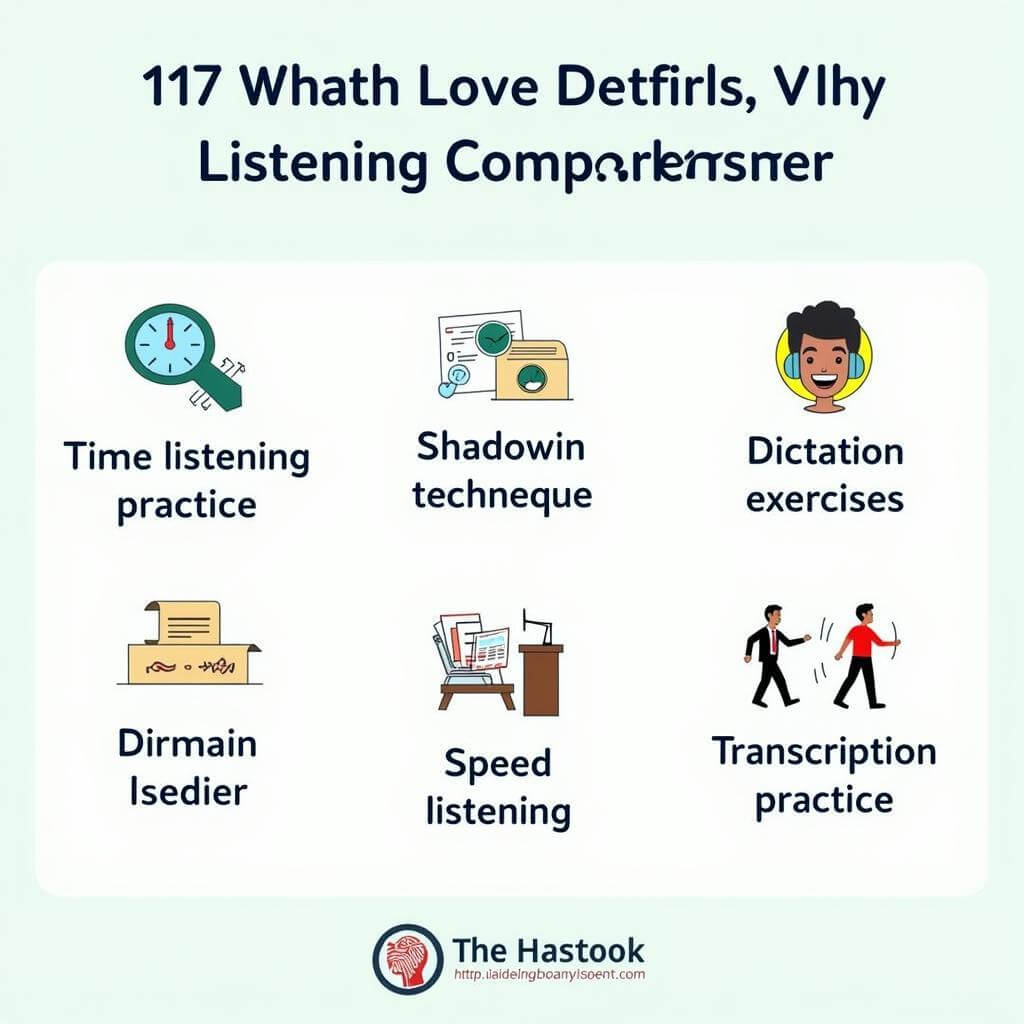Listening comprehension speed is a crucial skill for IELTS test-takers, particularly in the Listening section. Developing this ability allows candidates to process information quickly and accurately, leading to better performance and higher scores. In this article, we’ll explore effective strategies to enhance your listening comprehension speed and prepare you for success in the IELTS exam.
Understanding Listening Comprehension Speed
Listening comprehension speed refers to the ability to quickly understand and process spoken information. In the context of IELTS, it involves rapidly interpreting various accents, speech patterns, and complex ideas within a limited timeframe.
Improving listening accuracy naturally is closely related to enhancing comprehension speed. As you become more accurate in your listening, your speed will naturally improve.
Key Components of Listening Comprehension Speed
- Vocabulary recognition
- Contextual understanding
- Prediction skills
- Note-taking abilities
- Concentration and focus
Practical Exercises to Boost Listening Speed
Here are some effective exercises to help you improve your listening comprehension speed:
- Timed listening practice
- Shadowing technique
- Dictation exercises
- Speed listening with audio materials
- Transcription practice
Timed Listening Practice
Set a timer and challenge yourself to complete IELTS practice tests within the allocated time. Gradually reduce the time limit to push your listening speed.
Shadowing Technique
Listen to native English speakers and repeat what they say immediately after hearing it. This exercise enhances your ability to process information quickly.
Building listening focus naturally is essential for effective shadowing practice. As you improve your focus, you’ll find it easier to shadow speakers accurately.
Dictation Exercises
Listen to short audio clips and write down what you hear. Start with slow-paced recordings and progressively move to faster ones.
Speed Listening
Use audio materials at increasing speeds to train your ears to process information more quickly. Many podcast apps and audio players offer speed adjustment features.
How to use podcasts effectively for IELTS listening preparation can provide valuable insights into maximizing the benefits of speed listening practice.
Transcription Practice
Transcribe audio recordings word-for-word. This exercise hones your ability to catch every detail, even at high speeds.

Applying Listening Speed Techniques to IELTS Questions
Let’s explore how improved listening speed can be applied to different IELTS question types:
- Multiple choice questions
- Matching exercises
- Map/Plan/Diagram labeling
- Form/Note/Table/Flow-chart/Summary completion
- Sentence completion
Multiple Choice Questions
With enhanced listening speed, you can quickly eliminate incorrect options and focus on the most likely answers.
Matching Exercises
Faster processing allows you to connect information more efficiently, making matching tasks easier to complete within the time limit.
Map/Plan/Diagram Labeling
Improved speed helps you locate specific details rapidly and accurately place them on visual aids.
Focusing on specific keywords is particularly useful for these types of questions, as it allows you to quickly identify the required information.
Form/Note/Table/Flow-chart/Summary Completion
Quicker comprehension enables you to fill in gaps more swiftly, ensuring you don’t miss any crucial information.
Sentence Completion
Enhanced listening speed allows you to anticipate and accurately complete sentences based on the audio input.
Common Pitfalls to Avoid
While working on your listening comprehension speed, be aware of these potential mistakes:
- Sacrificing accuracy for speed
- Neglecting the importance of context
- Overlooking subtle pronunciation differences
- Failing to practice with various accents
- Ignoring the development of note-taking skills
Effective Training Methods
To maximize your listening comprehension speed improvement, consider these training methods:
- Regular exposure to native English content
- Varied listening materials (news, podcasts, audiobooks)
- Focused practice sessions
- Gradual increase in difficulty and speed
- Consistent self-assessment and progress tracking
How to sharpen listening skills for IELTS with audio books offers valuable insights into using audiobooks as an effective training tool for improving listening speed and comprehension.
Creating a Structured Practice Plan
Develop a weekly schedule that incorporates different listening exercises and gradually increases in difficulty. For example:
- Monday: Timed listening practice with IELTS mock tests
- Tuesday: Shadowing exercises with TED Talks
- Wednesday: Dictation practice using news broadcasts
- Thursday: Speed listening with podcasts
- Friday: Transcription exercises with academic lectures
- Saturday: Mixed practice focusing on weak areas
- Sunday: Review and self-assessment
Conclusion
Building listening comprehension speed is a critical component of IELTS success. By implementing the strategies and exercises outlined in this article, you can significantly enhance your ability to process and understand spoken English quickly and accurately. Remember to practice consistently, vary your listening materials, and gradually increase the difficulty of your exercises. With dedication and the right approach, you’ll be well-prepared to tackle the IELTS Listening section with confidence and achieve your desired score.
We encourage you to share your experiences and tips for improving listening comprehension speed in the comments below. How have these strategies worked for you? Do you have any additional techniques that have proven effective in your IELTS preparation? Let’s create a supportive community of learners working towards IELTS success!